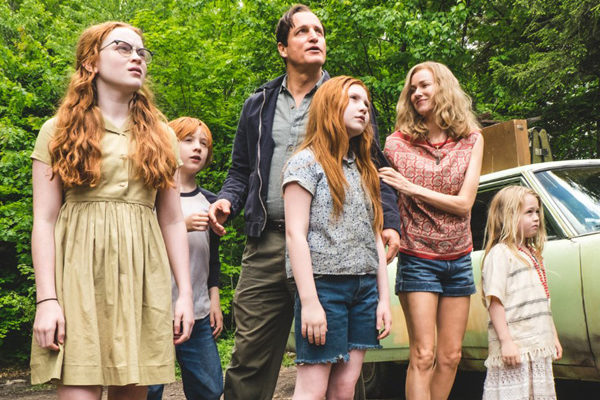The Glass Castle by Jeannette Walls is a best-selling memoir for a reason. Her wild ride of a childhood is compelling and her storytelling is impossible to resist. Jeannette did not have a normal upbringing by anyone’s definition. Her father was an alcoholic and the family was desperately poor—eating out of the trash poor—most of her youth. But this isn’t, exactly, about overcoming adversity. The tale is more complicated than that.
Even though Jeannette’s parents were squatters and she and her siblings slept in refrigerator boxes instead of beds, it wasn’t all trauma—some of it was fun. The family moved constantly, and each new place was an adventure. The children weren’t constrained by typical rules and were allowed to roam freely. Jeanette and her siblings ran wild through the desert and woods, exploring on their own, reading whatever they wanted, and rarely being burdened with schoolwork. Their free-wheeling childhood mirrored their parents’ own unconstrained approach to life.
Max and Rose Mary loved their children to the best of their ability, but they were deeply unconventional. They often moved in the middle of the night because they had to use “the skedaddle” to avoid bill collectors. They also did it because, as Rose Mary said, they were “adventure addicts.” On good days, Jeannette’s mother was an artist and her father was an inventor. On bad days (more frequent as the years went on), she was neglectful and he was a drunk. Their personal dysfunction meant their children were exposed to child molesters, cold, filth, and gnawing hunger—this despite inheritances that could have solved the family’s financial problems.
Jeannette writes in a matter-of-fact tone like the journalist she is. She rarely editorializes and is never sentimental. This choice spares readers discomfort and helps us experience the events as Jeannette did. For instance, when she’s young and doesn’t yet realize that other kids don’t live like this, the excitement and chaos of her life come through. As she grows older and the family arrives in West Virginia, things change. Her parents sink deeper into their addictions and proclivities, and the children can no longer pretend it’s a game. Jeannette and her siblings’ desperation to escape their circumstances sinks in, and the plan they hatch to survive is riveting.
The Movie Version
The movie version, released August 11th, focuses much more on how a grown-up Jeannette is dealing with the fallout of this dysfunctional childhood. Many of the adult scenes were added in by the screenwriter and do not appear in the novel. They shift the tone of the story in that Jeanette comes across as more vulnerable than she does in the book. The movie also sloughed off the worst of the past’s warts. Frankly, that’s probably for the best because I think it would be hard to *see* the poverty described in the book and still have any sympathy for the parents. The book and movie rely on the ambiguity of the parental relationship.
Casting stands out as a triumph. In particular Woody Harrelson was the perfect choice for Max Walls, the charming, wild, and sometimes mean father. Harrelson always comes across as unpredictable—capable of switching from kindness and cruelty in a split-second. That nails the father. Brie Larson and the young girls who play Jeannette as a child captivated. Naomi Watts, cast as Rose Mary, was dreamy and vulnerable—but much less crazy than the mother in the book. On the whole: well done.
So: should you bother with the movie version? If you’ve read the book, you’ll be a harsher critic than if you just see the film. For me, watching the movie revealed Jeannette’s past through the veneer of rose-colored glasses, which sentimentalized a genuinely challenging childhood. It also pulled punches. Those kids were dirty—like one bath a month dirty. Everything wasn’t always awful, but it wasn’t easy being a Walls kid. These parents weren’t just loopy hippies or creative types—they were negligent. That said, is a great cast, awesome costuming, beautiful cinema plus a story of survival worth it? You probably won’t be disappointed.
The Glass Castle Book Club Questions:
- Rex and Rose Mary Walls were unconventional parents, but were they abusive? Why or why not?
- Why does Jeannette see more ambiguity in her upbringing than her siblings do?
- Many children grow up in poverty and have parents that abuse substances. Why were the Walls children able to rise out of their circumstances?
- How do you think you would have reacted to being raised like a Walls? How would it change your perspective or approach to life?
- Why did the parents follow their children to New York? Why did the children keep seeing them?
(for people who also saw the movie)
- How did the new scenes of Jeannette as an adult square with your read of her from the book?
- How did the scenes of Jeannette as an adult change your perspective of her or her relationship with her family? Did it work for you? Why or why not?
- The movie centers on Jeannette’s relationship with her father in particular. Why did they have a special relationship? (Can pull from book and/or movie.)
- How did Naomi Watts’ version of Rose Mary compare with Rose Mary in the book? Was she abused by Rex? Was she as good a parent as Rex?


